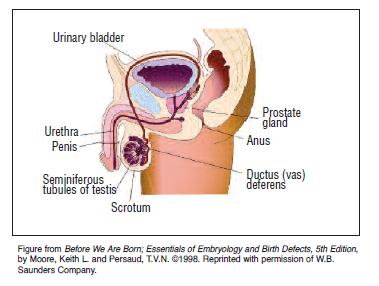Understanding Male Infertility

Infertility is a common issue that affects approximately 15% of couples worldwide. While most people assume that infertility is solely a female problem, the truth is that male infertility plays a significant role in about 30% of cases. Male infertility refers to a man’s inability to impregnate a fertile female partner, and it can be caused by various factors such as hormonal imbalances, genetic issues, lifestyle choices, and underlying medical conditions. In this blog post, we will delve deeper into the causes, symptoms, diagnosis, and treatment options for male infertility.
Causes of Male Infertility
There are several underlying causes of male infertility, and it is often a combination of multiple factors that contribute to the issue. Some of the most common causes of male infertility include:
Hormonal Imbalances
Hormones play a crucial role in sperm production, and any imbalances in the hormones can lead to fertility problems. Testosterone, follicle-stimulating hormone (FSH), and luteinizing hormone (LH) are all hormones that are essential for healthy sperm production. An imbalance in these hormones can result in low sperm count, poor sperm quality, and impaired sperm motility.
Genetic Issues
Genetic abnormalities can also cause male infertility. These can range from chromosomal defects to inherited conditions, such as cystic fibrosis and Klinefelter syndrome. In some cases, genetic issues can result in complete infertility, while in others, it can cause subfertility, where the sperm may have difficulty fertilizing an egg.
Lifestyle Choices
The way we live our lives can have a significant impact on our overall health, including our reproductive health. For men, certain lifestyle choices can impair sperm production and reduce sperm quality. These include excessive alcohol consumption, smoking, drug use, and being overweight or obese. These habits can lead to hormonal imbalances and damage to the reproductive organs, causing male infertility.
Underlying Medical Conditions
Various medical conditions can also contribute to male infertility. These may include infections, sexually transmitted diseases, and chronic health issues such as diabetes, kidney disease, and autoimmune disorders. Additionally, certain medications, such as chemotherapy or steroids, can also affect sperm production and cause infertility.
Diagnosing Male Infertility
Diagnosing male infertility involves a combination of physical examinations, medical history evaluation, and fertility testing. In most cases, the first step is to visit a urologist or a fertility specialist who will conduct a thorough examination and ask questions about your lifestyle and medical history.
Physical Examination
During a physical examination, the doctor will check for any visible abnormalities in the genitals, including varicocele (enlarged veins in the scrotum) or undescended testicles. The doctor may also check for any signs of hormonal imbalances, such as enlarged breasts or excessive body hair.
Semen Analysis
A semen analysis is usually the first fertility test recommended for men experiencing infertility. This test evaluates the quality and quantity of sperm in the ejaculate. Your doctor will provide you with a sterile cup and ask you to collect a sample of your semen, which will then be analyzed in a laboratory. The results of this test can help determine if there are any issues with sperm count, motility, or morphology (shape).
Genetic Testing
If there is a family history of genetic disorders or if the doctor suspects that a genetic issue may be causing male infertility, they may recommend genetic testing. This involves taking a blood sample from the individual and analyzing it for any genetic abnormalities that could be affecting sperm production.
Treatment Options for Male Infertility
The treatment for male infertility depends on the underlying cause and severity of the condition. In some cases, simple lifestyle changes may be enough to improve sperm production and increase the chances of conception. However, in more severe cases, medical intervention may be necessary.
Hormone Therapy
If hormonal imbalances are the cause of male infertility, hormone therapy may be recommended to restore the balance. This involves taking medications that can stimulate the production of testosterone, FSH, or LH, depending on which hormones are imbalanced.
Surgery
In some cases, surgery may be necessary to correct physical abnormalities that may be causing male infertility. For example, varicocele can be treated with minimally invasive surgery to improve sperm production. In other cases, surgery may be required to treat conditions such as a blockage in the vas deferens, which prevents sperm from reaching the ejaculate.
Assisted Reproductive Techniques (ART)
Assisted reproductive techniques, such as intrauterine insemination (IUI) and in-vitro fertilization (IVF), are commonly used to overcome male infertility. These procedures involve collecting sperm from the male partner and using them to fertilize the female partner’s egg either inside the body or in a laboratory setting.
The Importance of Male Fertility and Peyronie’s Clinic for Men’s Health
Lifestyle Factors and Male Infertility
As mentioned earlier, lifestyle choices can have a significant impact on male fertility. Therefore, making positive changes to your lifestyle can help improve sperm quality and increase the chances of conception.
Quit Smoking and Limit Alcohol Intake
Smoking has been linked to low sperm count, poor sperm motility, and abnormal sperm morphology. It is also known to cause DNA damage to sperm, making it difficult for them to fertilize an egg. Similarly, excessive alcohol consumption has been shown to lower testosterone levels and affect sperm production. Quitting smoking and limiting alcohol intake can significantly improve sperm quality and increase the chances of conception.
Maintain a Healthy Weight
Being overweight or obese can lead to hormonal imbalances, which can affect sperm production. On the other hand, being underweight can also have a negative impact on fertility. Maintaining a healthy weight through a balanced diet and regular exercise can help improve sperm quality and increase the chances of conception.
Avoid Exposure to Harmful Substances
Exposure to certain chemicals or toxins in the workplace can impair sperm production and lead to male infertility. These may include pesticides, heavy metals, and radiation. If you work in an environment where you are exposed to harmful substances, make sure to take necessary precautions, such as wearing protective equipment, to minimize their effects on your fertility.
The Role of Genetics in Male Infertility
Genetic issues can play a significant role in male infertility. While some genetic conditions are inherited, others may occur spontaneously. Some of the most common genetic disorders that can cause male infertility include chromosomal abnormalities, such as Klinefelter syndrome, Y chromosome deletions, cystic fibrosis, and Kartagener syndrome.
If you have a family history of any genetic disorders, it is essential to inform your doctor, who may recommend genetic testing to identify any underlying genetic issues that could be causing male infertility.
Male Fertility Testing: What You Need to Know
Male fertility testing is a crucial step in diagnosing and treating male infertility. As mentioned earlier, semen analysis is the most common test used to evaluate sperm quality and quantity. However, there are other tests available that can provide more in-depth information about male fertility.
Sperm DNA Fragmentation Test
Sperm DNA fragmentation refers to damage to the genetic material in sperm cells, which can affect their ability to fertilize an egg. A sperm DNA fragmentation test involves analyzing a sample of sperm for any DNA damage. This test is typically recommended for men who have had multiple failed attempts at conception using assisted reproductive techniques.
Anti-sperm Antibody Test
In some cases, the immune system can produce antibodies that attack and damage sperm, making it difficult for them to reach and fertilize an egg. An anti-sperm antibody test involves analyzing a sample of semen for these antibodies. If the test results are positive, your doctor may recommend treatments to reduce the number of antibodies in your body.
Unlocking the Surprising Cranberry Benefits for Men
Alternative Therapies for Male Infertility
In addition to medical treatments, there are also alternative therapies that can be used to improve male fertility. These include acupuncture, herbal supplements, and traditional Chinese medicine. While these methods have not been scientifically proven to increase fertility, some men have reported positive results after using them. It is essential to discuss any alternative therapies with your doctor before trying them.
Coping with Male Infertility: Tips for Couples
Dealing with infertility can be emotionally challenging for both partners. As a couple, it is essential to support each other and work together to cope with the situation. Some tips for coping with male infertility include:
- Communicate openly and honestly with each other about your feelings and concerns.
- Seek counseling or therapy to deal with the emotional impact of infertility.
- Practice stress-reducing techniques such as meditation or yoga.
- Do not blame yourself or your partner for the issue.
- Seek support from family and friends who can provide a listening ear and offer words of encouragement.
- Remember that infertility does not define you as a couple, and there are many other ways to build a family.
Preventing Male Infertility: What You Can Do
While some causes of male infertility are beyond our control, there are certain steps you can take to prevent fertility issues and improve overall reproductive health.
Practice Safe Sex
Sexually transmitted infections (STIs) can lead to fertility problems if left untreated. Therefore, it is crucial to practice safe sex by using condoms and getting tested regularly for STIs.
Avoid Exposure to Harmful Substances
As mentioned earlier, exposure to harmful chemicals and toxins in the workplace can affect sperm quality and quantity. If possible, try to avoid exposure to these substances or take precautions to minimize their effects.
Manage Your Stress Levels
Stress can have a negative impact on overall health, including reproductive health. Find healthy ways to manage stress, such as exercising, meditating, or talking to a therapist.
Conclusion
Male infertility is a common issue that affects many couples worldwide. Understanding the causes, symptoms, and treatment options for male infertility is crucial in addressing the issue and increasing the chances of conception. Lifestyle changes, medical treatments, and alternative therapies can all play a role in improving sperm quality and increasing fertility.
Remember to communicate openly with your partner and seek support from loved ones during this challenging time. With the right treatment and support, many couples are able to overcome male infertility and build their family.












